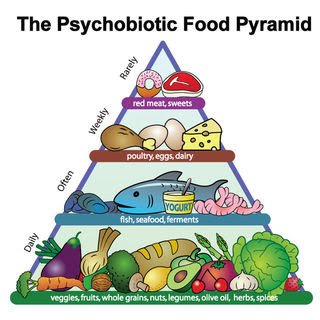In an age where stress and anxiety have become ubiquitous companions to our daily lives, strategies to mitigate these mental health concerns are not just necessary but essential. Beyond traditional methods like therapy and medication, there’s a burgeoning field of research suggesting that our diet, specifically one enriched with psychobiotics, can play a pivotal role in managing stress and anxiety. But what exactly are psychobiotics, and how do they influence our mental well-being?
Psychobiotics are live organisms that, when ingested in adequate amounts, confer mental health benefits by affecting gut microbiota. These typically include certain probiotics found in foods like yogurt, kefir, and fermented vegetables, as well as prebiotics found in foods like whole grains, bananas, and onions, which stimulate beneficial bacteria in the gut.
The Gut-Brain Axis: A Two-Way Street The key to understanding the impact of a psychobiotic diet lies in the gut-brain axis, the bidirectional communication route between the gastrointestinal tract and the nervous system. This connection means that our gut health directly affects our mental health and vice versa. In fact, some researchers even dub the gut as the “second brain” due to the vast network of neurotransmitters found there.
Reducing Stress and Anxiety with Psychobiotics When it comes to stress and anxiety, psychobiotics act as a natural balancer for our body’s stress response. Studies have shown that individuals who consume a psychobiotic-rich diet have lower cortisol levels — the body’s primary stress hormone — and report fewer stress-related symptoms. For example, Lactobacillus and Bifidobacterium, two common probiotics, have been noted to improve mood and cognitive function while decreasing anxiety-related behaviours.
Moreover, psychobiotics have been found to produce neurotransmitters such as serotonin and dopamine, which are critical for regulating mood, relaxation, and happiness. With a significant portion of neurotransmitters being produced in the gut, nourishing your body with psychobiotic-rich foods can foster a positive mental environment.
Incorporating Psychobiotics into Your Diet Embarking on a psychobiotic diet involves integrating foods rich in beneficial bacteria and those that promote their growth. Here are a few simple steps to get started:
- Diversify Your Diet: Incorporate a variety of fermented foods like yogurt, kefir, sauerkraut, kimchi, and kombucha to provide a broad spectrum of beneficial bacteria.
- Fiber is Your Friend: High-fiber foods such as fruits, vegetables, and whole grains are great prebiotics, fostering a healthy environment for your gut’s good bacteria.
- Check for Live Cultures: When choosing fermented foods, look for products labeled with “live and active cultures” to ensure you’re reaping the benefits.
Exploring the frontiers of mental wellness, Christian has extensively studied the psychobiotic diet’s impact on stress and anxiety, particularly its power to alleviate panic attacks. His practice at Counselling Services for Men transcends traditional therapy by integrating this profound nutritional insight, empowering clients with the knowledge to harness their gut-brain connection for improved mental health. Christian’s holistic approach not only educates but also emboldens individuals to cultivate inner tranquility through informed dietary and lifestyle transformations.
Conclusion While the concept of a psychobiotic diet is promising, it’s important to remember that it’s just one piece of the mental health puzzle. A balanced diet can significantly aid in reducing stress and anxiety, but it’s most effective when combined with other stress management techniques like regular exercise, adequate sleep, mindfulness practices, and professional therapy when needed.
By acknowledging the profound connectivity between what we consume and how we feel, we pave the way for a holistic approach to mental health. As we continue to uncover the mysteries of the gut-brain axis, one thing is clear: taking care of our gut is synonymous with taking care of our mind.

